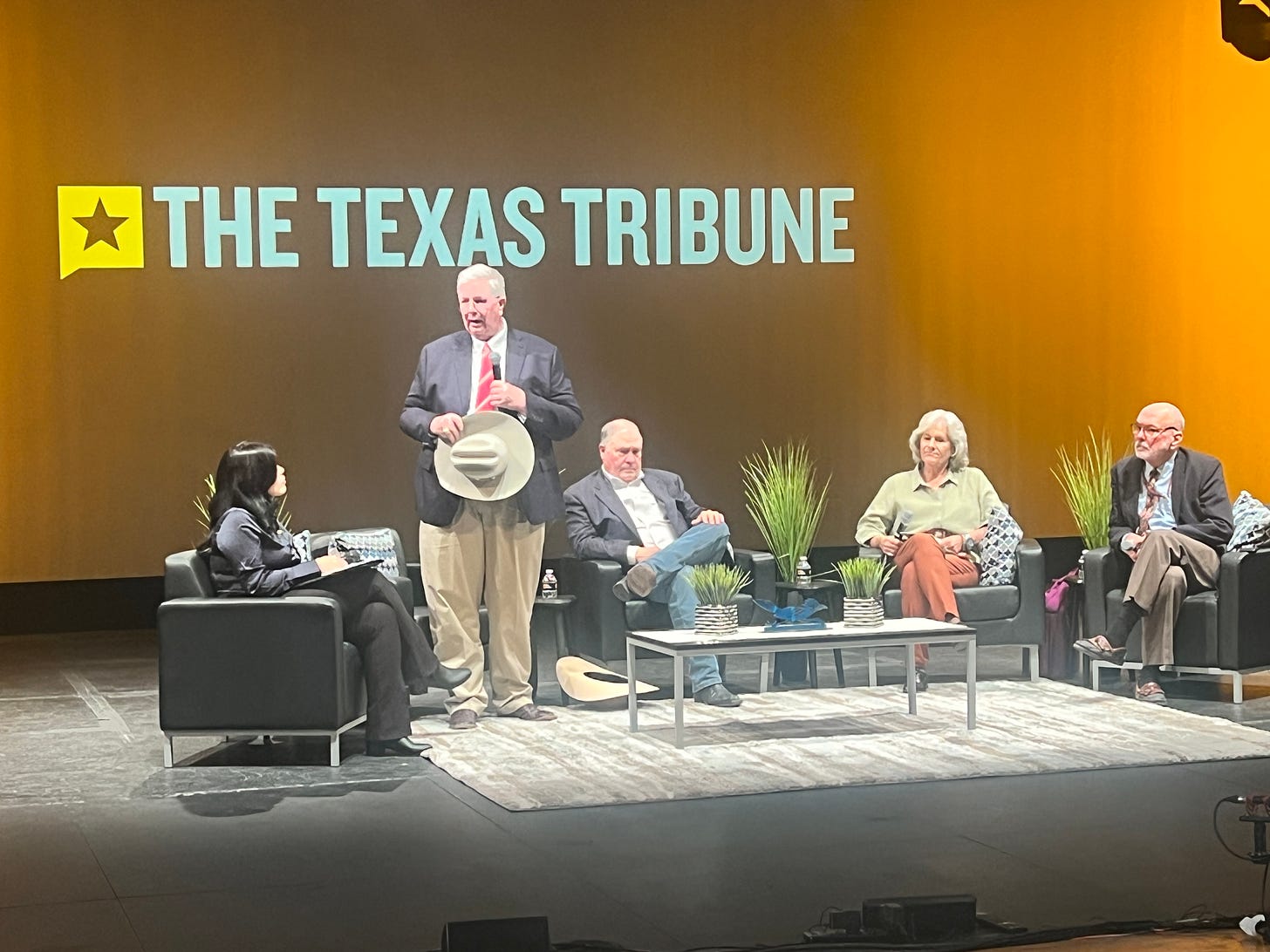Texas Leadership may not be in Sync with Red, Rural Texas
Last week, I traveled to San Antonio to attend a Rural Texas Symposium hosted by the Texas Tribune, a Texas media outlet that covers Texas politics and the legislature. To the Tribune’s credit, they have been working diligently to include regional coverage and have added more coverage of rural Texas, which is very much needed. The conference was well attended and the panels were very informative.
Amazing things are happening in the rural areas of Texas with significant opportunities being created at the local level by local folks for our rural communities. At that same time, there are major challenges facing rural Texas communities, and to that point, our leadership in Austin may not be in sync with red, rural Texans.
The best evidence of this disconnect was in the interview done with Texas Agriculture Commissioner Sid Miller. Miller was asked what he thought were the biggest concerns of rural Texans. Our man Sid, of course, pointed to the red meat, hot-button issues his consultants and pollsters have likely told him to say, which are to crack down on immigration, outlaw Chinese farmland, election integrity, and passing school choice vouchers. I will give him credit for talking about water because it was possibly the issue most discussed by the rural Texans over the two days as pressing, but on the other issues, and in particular school choice vouchers, well Sid would get an F for failing to understand what Rural Texans are concerned about.
Humorously, Sid went on to say that “20 legislators lost their seats” because they were not “attentive to rural needs”. Yes, that’s a fact. Rural Texas did lose a group of legislators, either to retirement or to challenges by Texas Governor Abbott in the Republican primary over school vouchers. In that group of legislators, were members with expertise in water, rural healthcare, agriculture, and public education. Contrary to Sid’s narrative and his lack of understanding, those members were strong advocates who had consistently demonstrated their support for rural Texas. The loss of these rural advocates means we also lost a wealth of experience and knowledge on the issues that matter most to rural Texans.
The panels at the symposium consisted of Texans from rural communities. They included locally elected officials, as well as business and non-profit leaders. Each presenter shared their experiences working in healthcare, education, economic development, energy, and agriculture in our rural Texas communities. These folks are the individuals who are working in the towns and on the farms to make it happen in rural Texas.

Unanimously, the speakers over several different panels stressed the importance of strong public education for rural communities and the critical need for state and community investment in public education. A parent and school leader on the panel went even further to say that rural school districts were underfunded, and this, along with negative narratives about public schools coming from school choice advocates out of Austin, is causing real harm to our rural schools and our communities. So in reality, these rural leaders say they support having strong public schools and would consider funding and other investments in public schools, not school choice, as one of their top issues.
Immigration was touched on during one panel related to agriculture. The panel expressed that a dependence on migrant populations for labor needed to be considered by policymakers and mass deportations would have an effect on agriculture. It was noted that many agricultural operations were already moving toward using H2A labor anticipating a crackdown on immigration.
The need for the state to focus on infrastructure investment was the unifying message from panelists throughout the two-day event. Investments by policymakers in water, rural broadband, roads, rural healthcare, emergency management resources, and public education are needed for rural Texans to continue to thrive. It was mentioned many times that rural Texas is small, but mighty in what it contributes to the Texas economy. The fuel, food, and fiber necessary to power Texas and provide products and services to the urban parts of the state are produced in Rural Texas.
Texas Republican leaders are making a huge mistake in continuing to push urban narratives and policies without regard to their impact on rural Texas. It is short-sighted for conservative urban legislators in Austin to dismiss their rural colleagues when they raise legitimate concerns around certain issues, such as education.
Texas is a diverse and expansive state, so much so that one might say we are writing a “Tale of Two Texas”. What will be necessary is a coalition of both urban and rural legislators working in sync and understanding with one another to address the most pressing needs for all of Texas. Crossing party lines and across city and county boundaries to work without partisanship and divisiveness to deliver strong policies and strategic investments in our assets to deliver opportunity for all Texans.
But also, with the growing urban population and a shrinking rural population, it will be imperative for rural Texans to speak powerfully and unapologetically for continued investments in our future.
Over the next six months, the Texas Rural Reporter will be following the Texas Legislature and writing about the policies under consideration that will impact rural Texas. We will be continuing to provide much of this work FREE but would appreciate your support as a PAID subscriber so that we can expand our reach. It costs only $8 a month or $80 for an annual subscription. If you love what we are doing, you can support us with Insider Membership for $240 a year. Insiders will get bonus weekly legislative reports starting in January and in-depth policy pieces on major rural issues. We are working to fill the gap and provide rural Texans with impactful analysis and commentary on what’s happening down in Austin. Thank you for reading!



